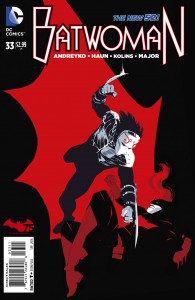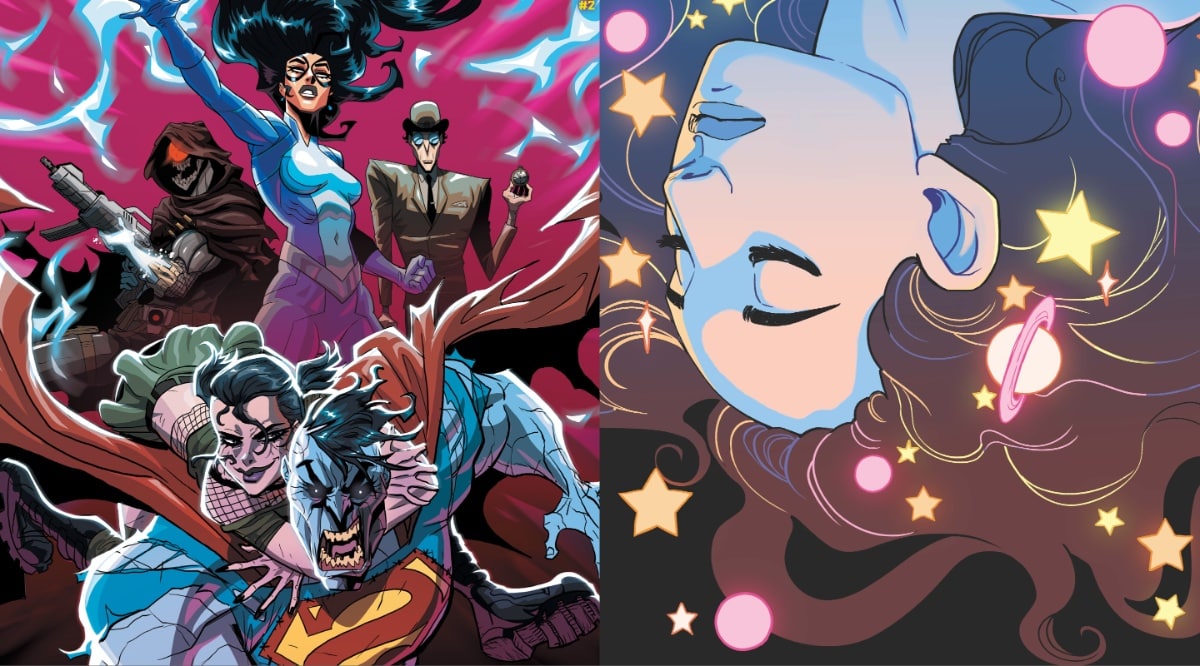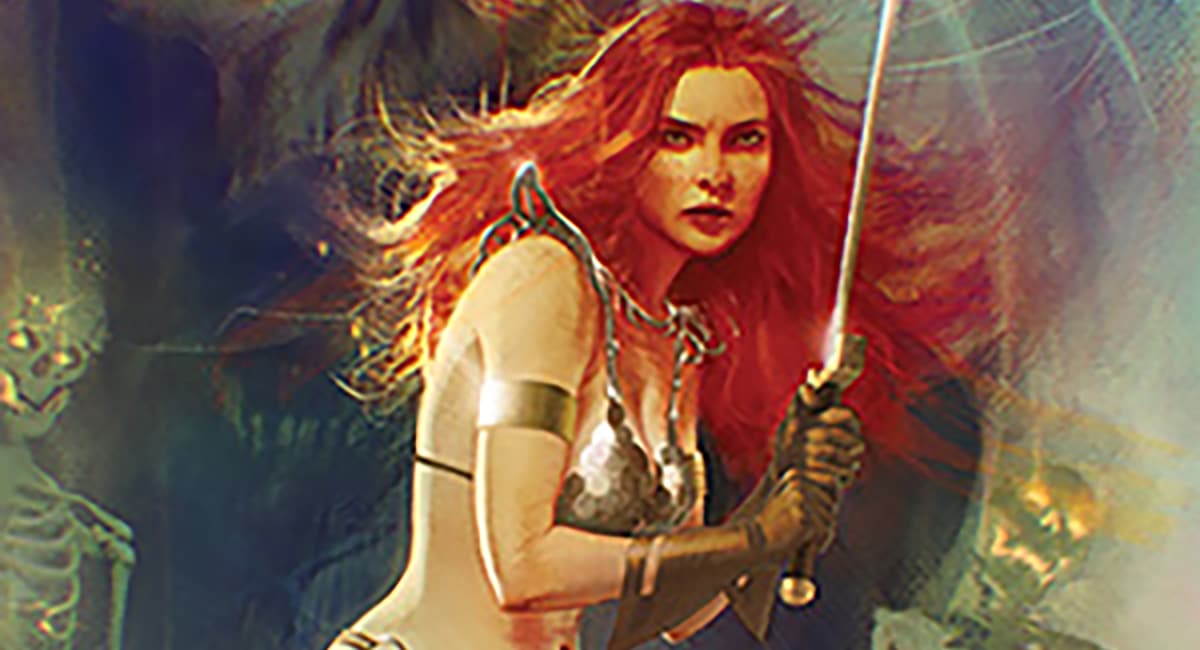By Matthew Jent
Marc Andreyko has written comics for DC, Marvel, IDW and Image for more than 10 years. He spoke to the Beat at the DC booth on the floor of San Diego Comic Con about writing DC’s Batwoman, what makes a superhero interesting, and the current state of comics and conventions.

Do you think of Batwoman as an extension of Batman, or is she a distinct character?
She’s definitely more distinct from Batman than Robin, or Nightwing. She’s sort of — Batman adjacent? The mantle of Batwoman made sense for her, because the bat is a powerful symbol in Gotham. But she has no idea that Batman is her cousin Bruce Wayne. And when given the opportunity to find out who Batman was, she was like, “I don’t want to know who you are. The less I know about you, the better. Keep the mask on.”
Which is in itself a nice distinction between the two characters.
Oh, absolutely.
Batman would want to know who Batman was.
He calls her out. He calls her Kate when she’s in costume. But she doesn’t know who he is, and she’s grateful not to know.
In any individual issue of Batwoman, there’s a nice balance between superhero stuff, relationship stuff, and crime stuff.
There has to be. I look at it this way — Spider-Man isn’t interesting because he’s fighting Doctor Octopus. Spider-Man is interesting because he’s 16, he’s got the flu, he’s late for school, he had to stand up his date, his aunt is sick and they’re gonna get evicted. All the fight stuff is video game stuff. It’s who’s behind the mask that resonates. As a kid, I identified with Peter Parker. We project ourselves into them. It’s the people behind the masks that are interesting.
Who would be your comic book BFF? Who would you hang out with?
Oh! It depends on which universe. In the DC Universe? Maybe Zatanna.
What would you guys do together?
I think we’d just hang out and talk shit. She seems fun! I’d love to hang out with the Henry Cavil Superman, but that’s a whole other story…
What’s your collaborative process like with the artists you work with?
I come up with the plot and talk to my editor to make sure characters are available. Then I write the script, and I give it to the artist — I write in a loose enough style to encourage them to be the director of photography. I write panel by panel, but I’m not Alan Moore. I always tell the artist, feel free to change the panel layout, play with it, you have that freedom. I’ve been lucky enough to work with artists who like that freedom.
But I’ve also had the misfortune of working with artists who, if you didn’t write it, it isn’t there. I had an artist who, in an 8-page of a fight scene, there were no backgrounds. They did the backgrounds in the first scene, because I wrote them in the first scene, assuming they would think — that I wouldn’t have to write them every time.
Those things from the first pages should still exist.
I come from a background in theater, so I like collaboration. I like happy accidents. On I Manhunter, the character Copperhead was being led out of the courtroom and he’s in a Hannibal Lecter mask. Jesus Saiz drew him looking at the main character with his snake tongue forking out at them. And I’m like, “Jesus, I’m taking credit for that!” Those sorts of things are great.
But I also like being able to cut dialogue. If an artist visually tells what I’ve written, I don’t need that dialogue there. There are some comic books, I look at them and they have like 600 words on a page. That obscures the art, it’s just these vomited bits of text. You don’t need to do that.
What comics or artists are you enjoying right now?
I love Terry Moore’s Rachel Rising, and I try to pimp it out as much as I can. I don’t know Terry personally, I have no horse in this race, I just love the book. It’s such a good, smart, horror book. It’s if David Lynch was a little bit more accessible. It’s a really elegant book.
I love anything Chris Samnee does. I got to work with him on Captain America & Bucky, and the stuff he does on Daredevil is spectacular. Chris’s storytelling sensibilities are insane. And he’s fast. It’s like, can we clone you and have you draw everything? He’s amazing.
There’s so much good stuff out there. It’s like saying, what’s your favorite kind of air?
What about Comic Con, how’s your show going?
It’s good. It’s a little quieter this year, which is nice. It’s Friday, and I still have a speaking voice. It’s become a trade show in a lot of ways, but this year it feels more fan-centered, and it feels like there’s a lot less of the douchey business side.
There’s been such exponential growth the past few years, so maybe it’s gotten to the new normal.
This is empty for Friday. I mean, it’s still crowded, but it’s empty for Friday. I’ve done some smaller cons, and I really like them. I did Phoenix Con in June, and that was glorious. It was like 80,000 people, but it was a real fan event. A nice mix of gay, straight, old, young, physically challenged, new fans, old fans. It felt like a safe, fun place, and it was so well organized. San Diego has become something of a behemoth, and I’m hoping we’re on a downward trend. I’m hoping it levels out. We could do about 20,000 people less.
Maybe take some of the movie booths out?
Well, there aren’t that many this year! Because the movie people realized, just because you’re popular at Con, maybe that’s all your audience. Of course everyone likes SuckerPunch at Con. But they were the only 12 people that went to see the movie. So why would you spend $20 million on Scott Pilgrim? They spent a fortune on that movie and thought, coming out of Con, that it was gonna be Avatar. But unfortunately most of their audience saw it here for free.
The TV stuff makes sense. TV storytelling is very similar to comics. It’s serial storytelling. But the more Hollywood studios get out of here, the better. In a lot of ways, comic books and creators are the bastard stepchildren at this event, and these executives wouldn’t be able to have their private planes if we didn’t create the Batmans and the X-Mens and the Spider-Mans and the Hellboys.
What’s this experience like? Being interviewed here at the DC booth, sitting in a director’s chair, kind of roped off?
It’s fun. I have a degree in theater and used to act, so it scratches that itch. Once you reach a certain age, once you’re over 40? You don’t care. If you ask me a question, I will answer it. Which sometimes gets me in trouble.







Great interview. I’m enjoying how he’s changed Batwoman and made it a much more balanced book between her life and crime-fighting.
Comments are closed.